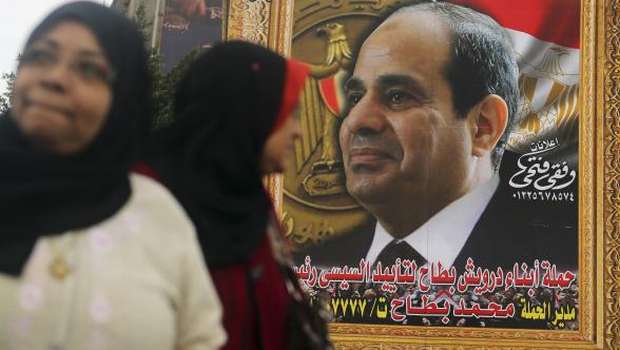
Women walk in front of a huge banner for Egypt’s army chief, Field Marshal Abdel Fattah al-Sisi in downtown Cairo, March 13, 2014. (Reuters/Amr Abdallah Dalsh)
Cairo, Asharq Al-Awsat—Presidential contenders Abdel-Fattah El-Sisi and Hamdeen Sabahy turned their attention to Egyptian voters abroad on Saturday as the country heads towards key presidential elections.
The Sisi campaign announced that it will be sending a senior campaign aide, Mohamed Badran, to a number of Gulf States to promote the former army chief’s campaign program to Egyptian expatriate voters. While well-informed sources within the Sabahy campaign told Asharq Al-Awsat that the Nasserite candidate would seek to connect with Egyptian voters abroad by holding video-conference question & answer sessions, particularly targeting Egyptian voters in the US and Europe.
Egyptian expatriate voters are scheduled to cast their ballots between 15 and 18 May. Egypt will vote on May 26-27.
Sabahy appeared in a four hour television interview broadcast on privately owned CBC and ONTV earlier this week during which he pledged to maintain a “civilian democratic system” if elected, adding that he would seek to increase government oversight over Egypt’s powerful military institution.
“The army and its budget should definitely be monitored,” he said, adding that he would seek to ensure that this fell under the purview of parliament. “Since the Egyptian people were the champions of both revolutions they should be the ones in power and not vice versa.”
“The army should support the will of the people, not lead or precede it,” Sabahy added in comments that have been viewed by some as a tacit criticism of former army chief and election rival Abdel-Fattah El-Sisi.
“Egypt is in need of the protection of the Egyptian army from both internal and external threat, but within the limits of not interfering in the political system,” he added.
With both presidential hopefuls pledging to crackdown on terrorism, differences between Sisi and Sabahy have largely related to the role of the military and a controversial protest law enacted last year.
Sabahy has pledged to amend the law if elected, while Egypt’s former army chief has backed the measure. Sabahy described the law as “unconstitutional,” adding that if elected, he will amend the law so that it “organizes the protests and sit-ins, rather than bans them.”
Speaking on Saturday, Egyptian Defense Minister Gen. Sedki Sobhi assured Egyptians that the armed forces are capable of guaranteeing successful presidential elections later this month.
In a speech in front of Egyptian troops, Sobhi said: “The armed forces are capable of guaranteeing and contributing to successful presidential elections.”
